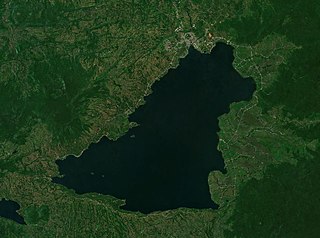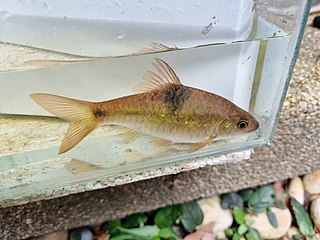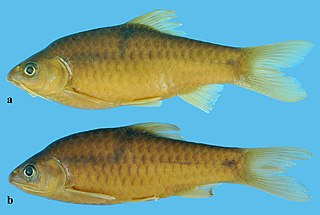
Barbus is a genus of ray-finned fish in the family Cyprinidae. The type species of Barbus is the common barbel, first described as Cyprinus barbus and now named Barbus barbus. Barbus is the namesake genus of the subfamily Barbinae, but given their relationships, that taxon is better included in the Cyprininae at least for the largest part.

Lake Lanao is a large ancient lake in the province of Lanao del Sur, Philippines. With a surface area of 340 km2 (130 sq mi), it is the largest lake in Mindanao, the deepest and second largest lake in the Philippines, and counted as one of the 15 ancient lakes in the world. Scholars have been pushing for the lake's inclusion in the UNESCO World Heritage List. The lake's native people call themselves the Maranao or Meranaw. Their name was derived from the name of the lake, meaning "the people living around the lake".

Barbonymus is a ray-finned fish genus in the family Cyprinidae, containing some barb species. The genus was only established in 1999, with the tinfoil barb as type species; thus, these fish are sometimes collectively called tinfoils. The new genus was established in recognition of the fact that some large Asian "barbs", formerly rather indiscriminately lumped in Barbus, Barbodes and Puntius, form a distinct evolutionary lineage.

Barbodes binotatus, commonly known as the spotted barb or common barb, is a tropical species of cyprinid fish endemic to Java, Indonesia.

Barbodes is a genus of small to medium-sized cyprinid fish native to tropical Asia. The majority of the species are from Southeast Asia. Many species are threatened and some from the Philippines are already extinct. A survey carried out in 1992 only found three of the endemic Barbodes species, and only two were found in 2008. Several members of this genus were formerly included in Puntius.

Auriglobus is a genus of freshwater pufferfishes native to Southeast Asia. They generally resemble Chonerhinos, but are considerably smaller, only reaching up to 13 cm (5.1 in) in length, and are more strongly associated with freshwater. The different Auriglobus species are very similar in appearance — greenish-golden or yellowish-golden above and pale below — but can be separated by morphometrics and meristics. Until 1999, the Auriglobus species were included in Chonerhinos.

Chonerhinos naritus, the bronze pufferfish or yellow pufferfish, is a species of pufferfish native to Southeast Asia, where mainly found in estuarine and coastal habitats. This species grows to a length of 28.5 centimetres (11.2 in) TL, but otherwise it generally resembles the smaller and more strictly freshwater Auriglobus pufferfish. This predatory species feeds on other fish, crustaceans and snails.

Lake Dapao is a deep water lake located in the province of Lanao del Sur, southwest of Lake Lanao, in the island of Mindanao in the Philippines. It is one of the deepest lakes in the country, reaching a maximum depth of 120 metres (390 ft). It has an estimated surface area of 1,011 hectares (10.11 km2). The lake receives water from local run-off and several small rivers.

Barbodes montanoi is a species of cyprinid fish endemic to the island of Mindanao, the Philippines. It is commonly known as pait, pait-pait, or paitan, along with other native Barbodes species. This species can reach a length of 9 centimetres (3.5 in) TL. It is silvery greenish-gray in color and is characterized by a body pattern of two to six black dots or dashes. The fins are yellowish to reddish in color. The species is named after the French naturalist and explorer Joseph Montano.

Barbodes rhombeus is a species of cyprinid fish native to the Southeast Asian countries of Cambodia, Laos and Thailand where it inhabits clear hill streams. This species can reach a length of 6.5 centimetres (2.6 in) SL.

Barbonymus belinka is a species of cyprinid fish that is endemic to the west coast of Sumatra. This species can reach a length of 23.5 centimetres (9.3 in) TL.

Hypselobarbus carnaticus, also known as the Carnatic carp, is a species of cyprinid fish from the Western Ghats in India where it inhabits riffles and larger pools in rapidly flowing rivers and streams. It prefers to shelter underneath boulders and overhangs. This species can reach a length of 60 centimetres (24 in) TL and has attained a maximum reported weight of 12 kilograms (26 lb). It is a commercially important fish and is also farmed.

Barbodes wynaadensis is a species of cyprinid fish. It is endemic to the Wyanad Plateau and its surroundings in the southern Western Ghats, India. It occurs in fast-flowing rivers and streams with rock substrates. This species can reach a length of 50 centimetres (20 in) TL. It is of minor importance to local commercial fisheries.
Caecogobius cryptophthalmus is a species of goby that is endemic to underground habitats in Calbiga on the Philippine island of Samar. This species is one of two members of the genus Caecogobius. Like other cavefish, C. cryptophthalmus has reduced eyes and pigmentation.
Barbpdes joaquinae is a species of freshwater ray-finned fish from the carp and minnow family, Cyprinidae. It is endemic to Lanao del Sur on Mindanao in the Philippines where it occurs in a single small stream draining from Basak Lake into the Agus River.
Barbodes palavanensis is a species of freshwater ray-finned fish from the carp and minnow family, Cyprinidae which is found in the Philippines. It has been considered to be conspecific with the widespread spotted barb which is found throughout mainland south-east Asia and the Malay Archipelago. It was recorded as being abundant in two streams on the island of Palawan, alongside the newly described endemic goby, Stiphodon palavanensis and the cyprinid Rasbora everetti.
Barbodes umalii is a species of freshwater ray-finned fish from the carp and minnow family, Cyprinidae which is found in the Philippines where it has only been recorded from the Agus River system on Mindanao.
Barbodes xouthos is a species of freshwater ray-finned fish from the carp and minnow family Cyprinidae. It has only been recorded from Brunei on the island of Borneo. It has an unusual pattern on its body consisting of a plain brown body with faint reticulations.

Barbodes sellifer, the saddled barb, is a species of cyprinid fish described in 2021. This species has not been reported sold in the aquarium trade, but where the species is present reports of them being kept by aquarists are abundant.

Barbodes zakariaismaili, or Zakaria's barb, is a newly described species of cyprinid fish as of 2021. The species is native to Malaysia, where it is found in foothills and lowland streams with clear water in the southern Malay Peninsula. The species has very little to no significant commercial value.













